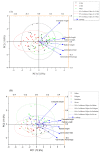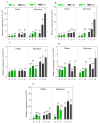Improvement of Drought Tolerance by Exogenous Spermidine in Germinating Wheat (Triticum aestivum L.) Plants Is Accompanied with Changes in Metabolite Composition
- PMID: 36012316
- PMCID: PMC9409228
- DOI: 10.3390/ijms23169047
Improvement of Drought Tolerance by Exogenous Spermidine in Germinating Wheat (Triticum aestivum L.) Plants Is Accompanied with Changes in Metabolite Composition
Abstract
Drought is one of the most important environmental factors reducing the yield and production of crops, including wheat. Polyamines are closely associated with plant stress tolerance. The present study investigated the mechanisms through seed germination with spermidine protecting wheat varieties from drought stress. In the first experiment, the effects of spermidine on the germination of wheat varieties, namely Rakhshan, Mihan, Sirvan and Pishgam, were investigated in three drought levels, namely 0, -2, and -4 MPa induced by polyethylene glycol 6000. Analysis of variance indicated that spermidine, drought stress and interaction between varieties and drought stress were significant for all traits, and with severity of stress, all traits significantly decreased. In the second experiment, detailed gene expression and non-targeted metabolomics analyses were carried out using the Rakhshan and Mihan varieties after germination, with or without spermidine treatment and/or drought stress. According to the biomass parameters, the Mihan variety showed relatively better growth compared to the other variety, but the Rakhshan one showed more pronounced responses at gene expression level to exogenous spermidine than the Mihan variety. Overall, these results showed that spermidine increased the drought tolerance of wheat at the germination stage, due to specific role of polyamine metabolism in the development of effective responses under drought stress.
Keywords: drought stress; exogenous spermidine; gene expression; metabolomics; seed germination; wheat.
Conflict of interest statement
The authors declare no conflict of interest.
Figures











References
-
- Ghassemi S., Farhangi-Abriz S., Faegi-Analou R., Ghorbanpour M., Lajayer B.A. Monitoring Cell Energy, Physiological Functions and Grain Yield in Field-Grown Mung Bean Exposed to Exogenously Applied Polyamines under Drought Stress. Soil Sci. Plant Nutr. 2018;18:1108–1125. doi: 10.4067/S0718-95162018005003102. - DOI
-
- Peng J.H., Sun D., Nevo E.J.M.B. Domestication Evolution, Genetics and Genomics in Wheat. Mol. Breed. 2011;28:281–301. doi: 10.1007/s11032-011-9608-4. - DOI
-
- Singh G., Chaudhary H. Selection Parameters and Yield Enhancement of Wheat (Triticum aestivum L.) under Different Moisture Stress Conditions. Asian J. Plant Sci. 2006;5:894–898. doi: 10.3923/ajps.2006.894.898. - DOI
-
- Farooq M., Wahid A., Lee D.J. Exogenously Applied Polyamines Increase Drought Tolerance of Rice by Improving Leaf Water Status, Photosynthesis and Membrane Properties. Acta Physiol. Plant. 2009;31:937–945. doi: 10.1007/s11738-009-0307-2. - DOI
MeSH terms
Substances
Grants and funding
LinkOut - more resources
Full Text Sources

